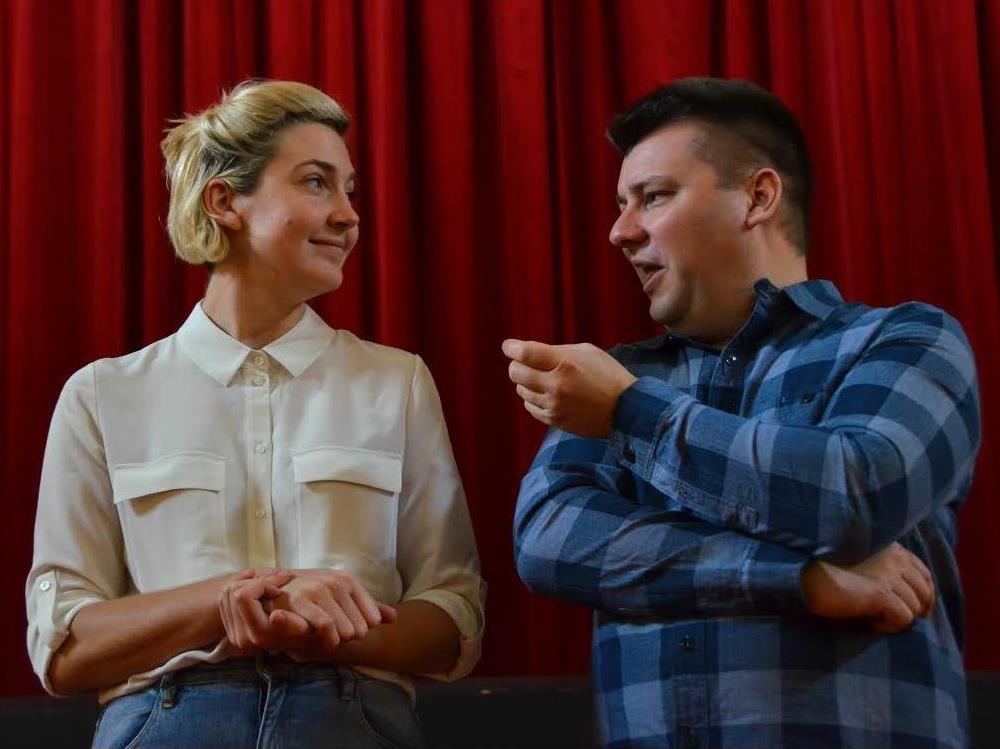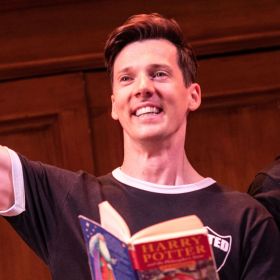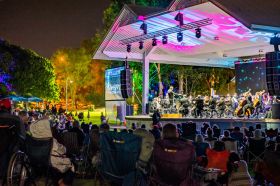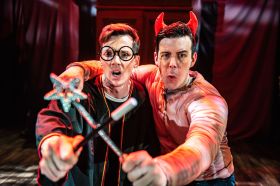Quiet Faith publicity image by Heath Britton, courtesy of Vitalstatistix
David Williams’ latest work arose from the simple understanding that the type of Christianity we see on the news and engaged with politics – the Fred Niles of this world – might not be an accurate representation of all aspects of Australian Christianity. Quiet Faith seeks to give a voice to those other aspects and invites the audience to see and understand a much more complicated picture.
It succeeds entirely.
Williams conducted interviews with a range of believers, both congregation and clergy, to ask them about their faith and how they feel religion and politics should be balanced. There is a sprinkling of music, song and prayer but excerpts from these interviews are absolutely the focal point. Everything from the design and lighting to the extremely up-close performance combines to give these voices an arresting power and weight.
The audience is seated on benches arranged in three circles, a bit like the congregation of a round church. Above there is a literal halo of light, and candles flicker throughout the space. With a few simple, elegant choices the design team has created a space for meditation and intimate, thoughtful conversation.
Into this space the two performers enter, walking amongst the benches, sitting down between members of the audience and delivering their interview answer to whoever happens to be sitting next to them. Instantly the performance is a conversation and we, the audience, are one half of it. We asked the question and we are getting the answer delivered directly to us. It’s like sitting inside a documentary and the effect is striking. And of course the audience reactions are now part of the experience. The scene is not just the performer but also the person smiling or laughing along with them, or the person sitting behind who unconsciously crosses their arms and frowns in disagreement.
Both Williams and his fellow performer Ashton Malcolm are compelling. They deliver lines in a very realistic style, complete with all the stutterings, pauses and half-finished sentences of everyday conversation. As they jump from interviewee to interviewee, they speak each answer without any sense of judgement or editorialising. They infuse each answer with earnest enthusiasm and a depth of personality, creating the impression that the original respondent really is sitting a foot away and making direct eye contact.
However, the most fascinating part of Quiet Faith are the answers themselves. Williams has done an excellent job distilling and range of views and laying them out for examination, warts and all. The result is not a single, driving message but a kaleidoscope in which some shades shine and connect while others still feel dark and very uncomfortable. A woman expressing her horror at the compassionless nature of the Abbott government is placed alongside a man who believes, without doubt, that he has had a genuine Visitation (a particularly disconnecting moment for this atheist reviewer).
A young student talks about what they think of homosexuals and, while their answer shows a genuine wish to be compassionate and good, it also shows a stunning failure to see the boundaries of their own privilege and prejudice. This student sits sprawled on the floor in the very centre of the circled benches (or pews) and the moment perfectly illustrates how much power Quiet Faith draws from audience reactions. As everybody sits forward on the edge of their seat, willing the student towards an enlightened statement, there is the sort of tension and release you normally only feel at football games. The audience has a certain group identity, aware of each other in a way that is rare in the theatre.
The moment is also interesting in the context of the overall show. Quiet Faith makes it clear that the audience might be carrying a little unseen prejudice of their own. Don’t assume, it says, that you understand every Christian just because you have seen George Pell on the news. And certainly, the message isn’t that you will now understand all aspects of Christianity because you have seen this performance.
Instead, Quiet Faith introduces you to a varied and complicated group of people and invites you to understand that maybe, just maybe, you don’t yet fully understand them.
Quiet Faith
Written and Directed by David Williams
Presented by Vitalstatistix
Starring David Williams and Ashton Malcolm
Playing at Waterside, Port Adelaide 8-19 October





